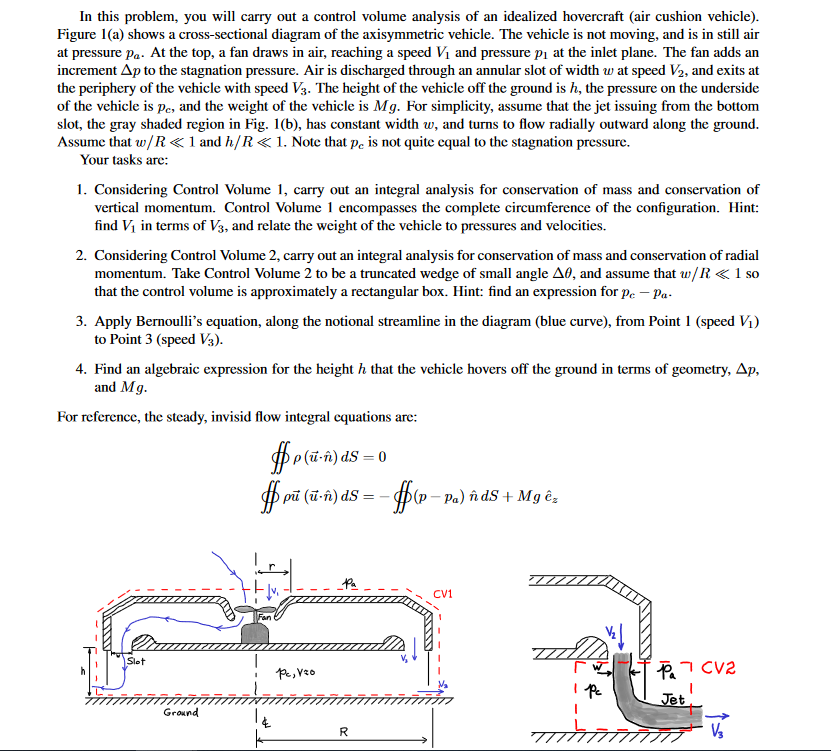Answered step by step
Verified Expert Solution
Question
1 Approved Answer
In this problem, you will carry out a control volume analysis of an idealized hovercraft (air cushion vehicle). Figure 1(a) shows a cross-sectional diagram

In this problem, you will carry out a control volume analysis of an idealized hovercraft (air cushion vehicle). Figure 1(a) shows a cross-sectional diagram of the axisymmetric vehicle. The vehicle is not moving, and is in still air at pressure pa. At the top, a fan draws in air, reaching a speed V and pressure p at the inlet plane. The fan adds an increment Ap to the stagnation pressure. Air is discharged through an annular slot of width wat speed V2, and exits at the periphery of the vehicle with speed V3. The height of the vehicle off the ground is h, the pressure on the underside of the vehicle is pe, and the weight of the vehicle is Mg. For simplicity, assume that the jet issuing from the bottom slot, the gray shaded region in Fig. 1(b), has constant width w, and turns to flow radially outward along the ground. Assume that w/R1 and h/R < 1. Note that pe is not quite equal to the stagnation pressure. Your tasks are: 1. Considering Control Volume 1, carry out an integral analysis for conservation of mass and conservation of vertical momentum. Control Volume 1 encompasses the complete circumference of the configuration. Hint: find V in terms of V3, and relate the weight of the vehicle to pressures and velocities. 2. Considering Control Volume 2, carry out an integral analysis for conservation of mass and conservation of radial momentum. Take Control Volume 2 to be a truncated wedge of small angle A0, and assume that w/R < 1 so that the control volume is approximately a rectangular box. Hint: find an expression for pe - Pa. 3. Apply Bernoulli's equation, along the notional streamline in the diagram (blue curve), from Point 1 (speed V) to Point 3 (speed V3). 4. Find an algebraic expression for the height h that the vehicle hovers off the ground in terms of geometry, Ap, and Mg. For reference, the steady, invisid flow integral equations are: ffp (u-) ds = 0 pu (un) dS: =- - ff(p pa) dS + Mg z ff pu Slot Ground Pc, V20 Pa R CV1 Pc Pa7 CV2 Jet 3
Step by Step Solution
There are 3 Steps involved in it
Step: 1

Get Instant Access to Expert-Tailored Solutions
See step-by-step solutions with expert insights and AI powered tools for academic success
Step: 2

Step: 3

Ace Your Homework with AI
Get the answers you need in no time with our AI-driven, step-by-step assistance
Get Started


